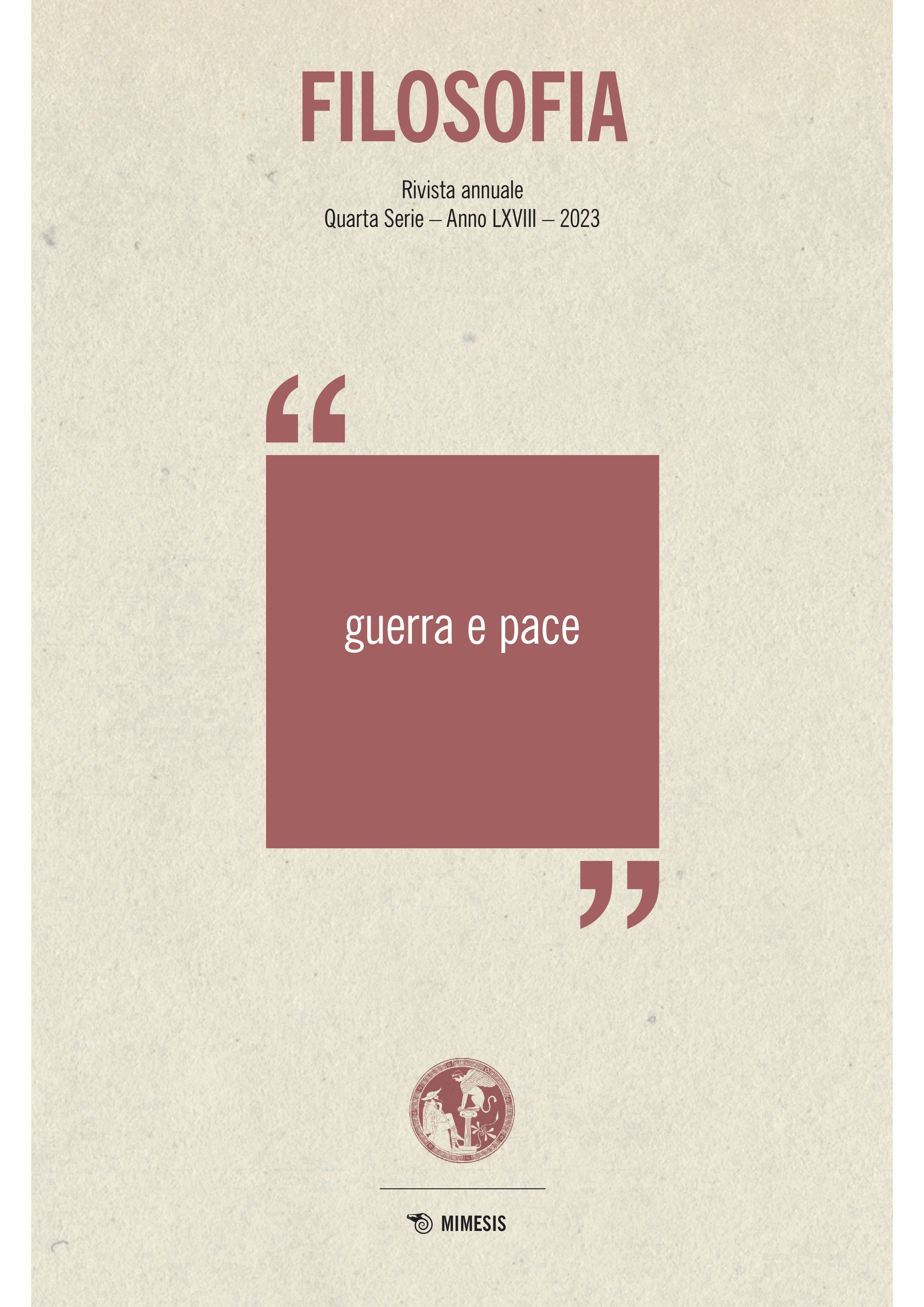The psychological foundations of war and the remedies for peace in Hobbes and Kant
DOI:
https://doi.org/10.13135/2704-8195/9206Keywords:
Egoism, Hobbes, Kant, Peace, WarAbstract
In 1932, Albert Einstein asked Freud for a way to free humanity from war, stating that no attempt had yielded anything. This article attempts to draw some elements from Hobbes and Kant to answer Einstein’s question. The two philosophers provide various reasons for conceiving peace and war not in dichotomous terms, but as always coexisting polarities – in variable proportions – in the continuum of possible human interactions. In the philosophical perspective outlined here, given the fundamental ambiguity of human beings, there is no exhaustive and definitive answer to Einstein’s question. Following Hobbes and Kant, what can be achieved is not the elimination of any possibility of war, but the progressive improvement of understanding the measures that allow for the reduction of the probability of open hostility among individuals, groups, and States.
Downloads
References
Abizadeh, Arash. 2011. “Hobbes on the Causes of War. A Disagreement Theory”. The American Political Science Review 105, 2: 298-315.
Blits, Jan H. 1989. “Hobbesian Fear”. Political Theory 17, 3: 417-431.
Bodei, Remo. 1994. Geometria delle passioni. Milano: Feltrinelli.
Bobbio, Norberto. 1989. Thomas Hobbes. Torino: Einaudi.
Eibl-Eibesfeld, Irenäus. 2023. Etologia della guerra. Tr. it. Giuseppe Longo, rivista da Pietro Budinich. Torino: Bollati Boringhieri.
Einstein, Albert. 2017. “Lettera di Einstein a Freud” in Freud Sigmund, e Albert Einstein, Perché la guerra?, 59-63. Tr. it. Cesare L. Musatti, Silvano Daniele, Sandro Candreva, Ermanno Sagittario. Torino: Bollati Boringhieri.
Freud, Sigmund. 1978. “Considerazioni attuali sulla guerra e la morte” in Freud Sigmund, Opere 8, 1915-1917. Introduzione alla psicoanalisi e altri scritti, 119-148. Musatti Cesare L., a cura di. Torino: Boringhieri.
Freud, Sigmund. 2017. “La risposta di Freud” in Freud Sigmund, e Albert Einstein, Perché la guerra?, 64- 80. Tr. it. Cesare L. Musatti, Silvano Daniele, Sandro Candreva, Ermanno Sagittario. Torino: Bollati Boringhieri.
Frierson, Patrick R. 2014. Kant’s Empirical Psychology. Cambridge: Cambridge University Press.
Gallie, Walter Bryce. 1993. Filosofia di pace e guerra. Kant, Clausewitz, Marx, Engels, Tolstoj. Tr. it. Gino Scatasta. Bologna: il Mulino.
Gert, Bernard. 1967. “Hobbes and Psychological Egoism”. Journal of the History of Ideas 28, 4: 503-520.
Hobbes, Thomas. 1972. Elementi di filosofia. Il corpo. L’uomo. Antimo Negri, a cura di. Torino: Utet.
Hobbes, Thomas. 1979. Behemoth. Nicastro Onofrio, a cura di. Roma-Bari: Laterza. Hobbes, Thomas. 1984. Introduzione a «La guerra del Peloponneso» di Tucidide. Borrelli Gianfranco, a cura di. Napoli: Bibliopolis.
Hobbes, Thomas. 1989. Elementi di legge naturale e politica. Tr. it. Arrigo Pacchi. Firenze: La Nuova Italia.
Hobbes, Thomas. 1998. Leviatano. Pacchi Arrigo, a cura di. Tr. it. Agostino Lupoli, Maria Vittoria Predaval, Riccarda Rebecchi. Roma-Bari: Laterza.
Hobbes, Thomas. 1999. De cive. Elementi filosofici sul cittadino. Magri Tito, a cura di. Roma: Editori Riuniti.
Holmes, Stephen. 1972. “Political Psychology in Hobbes’ Behemoth” in Thomas Hobbes and Political Theory, Dietz Mary, a cura di, 120-152. Lawrence: University of Kansas Press.
Jonas, Hans, e Wolfgang Knöbl. 2013. War in Social Thought. Hobbes to the Present. Princeton and Oxford: Princeton University Press.
Kant, Immanuel. 1970a. “La religione nei limiti della semplice ragione” in Scritti morali, Chiodi Pietro, a cura di, 317-534. Torino: Utet.
Kant, Immanuel. 1970b. “Antropologia dal punto di vista pragmatico” in Scritti morali, Chiodi Pietro, a cura di, 535-757. Torino: Utet.
Kant, Immanuel. 1992. Fondazione della metafisica dei costumi, Pirillo Nestore, a cura di. Tr. it. Pietro Chiodi. Roma-Bari: Laterza.
Kant, Immanuel. 1993. Per la pace perpetua. Tr. it. Roberto Bordiga. Milano: Feltrinelli.
Kant, Immanuel. 2005. Primi principi metafisici della dottrina del diritto, Filippo Gonnelli, a cura di. Roma-Bari: Laterza.
Kant, Immanuel. 2014a. “Idee per una storia universale dal punto di vista cosmopolitico” in Scritti di storia, politica e diritto, Gonnelli Filippo, a cura di, 29-44. Roma-Bari: Laterza.
Kant, Immanuel. 2014b. “Risposta alla domanda: cos’è illuminismo?”, in Scritti di storia, politica e diritto, Gonnelli Filippo, a cura di, 45-52. Roma-Bari: Laterza.
Kant, Immanuel. 2014c. “Inizio congetturale della storia degli uomini” in Scritti di storia, politica e diritto, Gonnelli Filippo, a cura di, 103-118. Roma-Bari: Laterza.
Kersting, Wolfgang. 2002. Thomas Hobbes zur Einführung. Hamburg: Junius.
McNeilly, Francis Stewart. 1968. The Anatomy of Leviathan. London: Macmillan.
Mori, Massimo. 2008. La pace e la ragione. Kant e le relazioni internazionali: diritto, politica, storia. Bologna: il Mulino.
Newey, Glen. 2008. Routledge Philosophy Guidebook to Hobbes and Leviathan. Abingdon-New York: Routledge.
Nicastro, Onofrio. 1979. “Introduzione” in Hobbes, Thomas, Behemoth, VII-XLVII. Roma- Bari: Laterza.
Onians, Richard Broxton. 1998. Le origini del pensiero europeo. Intorno al corpo, la mente, l’anima, il mondo, il tempo e il destino. Tr. it. Paolo Zaninoni. Milano: Adelphi.
Pettit, Philip. 2008. Made with Words. Hobbes on Language, Mind, and Politics. Princeton and Oxford: Princeton University Press.
Ratulea, Gabriela. From the Natural Man to the Political Machine. Sovereignty and Power in the Works of Thomas Hobbes. Frankfurt am Main: Peter Lang.
Reale, Mario. 1991. La difficile eguaglianza. Hobbes e gli animali politici: passioni morale socialità. Roma: Editori Riuniti.
Sorgi, Giuseppe. 1989. Quale Hobbes? Milano: Franco Angeli.
Vaughan, Geoffrey M. 2002. Behemoth Teaches Leviathan. Thomas Hobbes on Political Education. Lanham: Lexington Books.
Williams, Howard. 2012. Kant and the End of War. A Critique of Just War Theory. New York: Macmillan.
Downloads
Published
How to Cite
Issue
Section
License

This work is licensed under a Creative Commons Attribution 4.0 International License.
This work is licensed under a Creative Commons Attribution 4.0 International License



